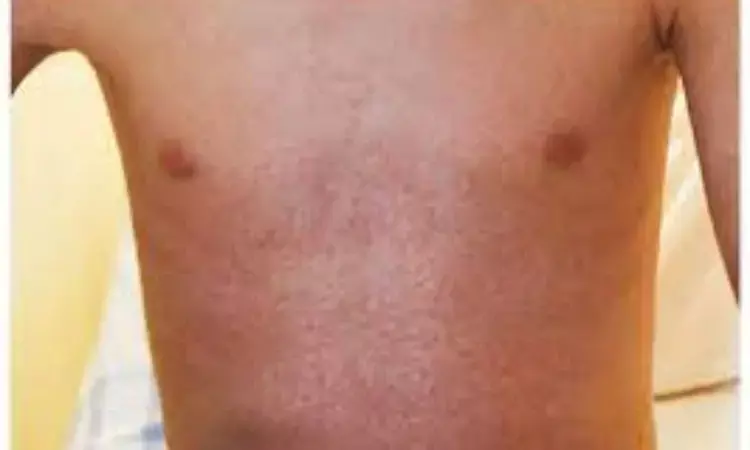- Home
- Medical news & Guidelines
- Anesthesiology
- Cardiology and CTVS
- Critical Care
- Dentistry
- Dermatology
- Diabetes and Endocrinology
- ENT
- Gastroenterology
- Medicine
- Nephrology
- Neurology
- Obstretics-Gynaecology
- Oncology
- Ophthalmology
- Orthopaedics
- Pediatrics-Neonatology
- Psychiatry
- Pulmonology
- Radiology
- Surgery
- Urology
- Laboratory Medicine
- Diet
- Nursing
- Paramedical
- Physiotherapy
- Health news
- Fact Check
- Bone Health Fact Check
- Brain Health Fact Check
- Cancer Related Fact Check
- Child Care Fact Check
- Dental and oral health fact check
- Diabetes and metabolic health fact check
- Diet and Nutrition Fact Check
- Eye and ENT Care Fact Check
- Fitness fact check
- Gut health fact check
- Heart health fact check
- Kidney health fact check
- Medical education fact check
- Men's health fact check
- Respiratory fact check
- Skin and hair care fact check
- Vaccine and Immunization fact check
- Women's health fact check
- AYUSH
- State News
- Andaman and Nicobar Islands
- Andhra Pradesh
- Arunachal Pradesh
- Assam
- Bihar
- Chandigarh
- Chattisgarh
- Dadra and Nagar Haveli
- Daman and Diu
- Delhi
- Goa
- Gujarat
- Haryana
- Himachal Pradesh
- Jammu & Kashmir
- Jharkhand
- Karnataka
- Kerala
- Ladakh
- Lakshadweep
- Madhya Pradesh
- Maharashtra
- Manipur
- Meghalaya
- Mizoram
- Nagaland
- Odisha
- Puducherry
- Punjab
- Rajasthan
- Sikkim
- Tamil Nadu
- Telangana
- Tripura
- Uttar Pradesh
- Uttrakhand
- West Bengal
- Medical Education
- Industry
DRESS syndrome tied to high risk of complications in elderly, mainly kidney involvement and sepsis: Study

Tunisia: A recent study has revealed that drug reaction with eosinophilia and systemic symptoms (DRESS) in the elderly is associated with a high complications risk, mainly sepsis and kidney involvement, often due to allopurinol use. The study was published online in Dermatitis on September 5, 2023.
The retrospective cohort study comprising patients hospitalized for DRESS revealed that the clinical characteristics were frequently observed in those aged ≥65 years including sepsis at initial presentation, renal impairment, and drug reactions from allopurinol use.
Drug reaction with eosinophilia and systemic symptoms, also known as drug-induced hypersensitivity syndrome and by various other names, is a rare drug reaction characterized by eosinophilia, a skin rash, and organ involvement. It is recognized as one of the severe cutaneous adverse reactions (SCAR) and can be potentially life-threatening with a high mortality rate of 10%. Historically, it was most frequently linked with phenytoin and was initially described as phenytoin hypersensitivity syndrome.
Khaoula Trimeche, Hedi Chaker University Hospital, El Ain, Tunisia, and colleagues aimed to focus on the clinical and epidemiological characteristics of DRESS in the elderly and to identify the incriminated drugs.
The retrospective study included patients hospitalized for DRESS with a RegiSCAR ≥4. 55 patients were divided into two groups according to age: 65 years or older (G1; 30.9%) and <65 years (G2; 69.1%). Comparative and multivariate analyses were used to perform the statistical study.
The study revealed the following findings:
- Skin manifestations were comparable in both groups.
- Lymphadenopathy was less common in G1 with a statistically significant difference.
- Renal impairment was more frequent in the elderly with a statistically significant result.
- DRESS in the elderly group was significantly associated with the occurrence of sepsis.
- Allopurinol was the most common culprit associated with DRESS in G1.
- Relapses and recurrences were comparable in both groups.
"In the elderly, DRESS is associated with a high complications risk, mainly sepsis and kidney involvement," the researchers wrote. "Allopurinol is the most incriminated drug."
Reference:
Emna Bahloul, Khaoula Trimeche, Khadija Sellami, Fatma Hammami, Faten Hayder, Rim Chaabouni, Meriem Amouri, Abderrahmen Masmoudi, Madiha Mseddi, Sonia Boudeya, and Hamida Turki.
Dr Kamal Kant Kohli-MBBS, DTCD- a chest specialist with more than 30 years of practice and a flair for writing clinical articles, Dr Kamal Kant Kohli joined Medical Dialogues as a Chief Editor of Medical News. Besides writing articles, as an editor, he proofreads and verifies all the medical content published on Medical Dialogues including those coming from journals, studies,medical conferences,guidelines etc. Email: drkohli@medicaldialogues.in. Contact no. 011-43720751


